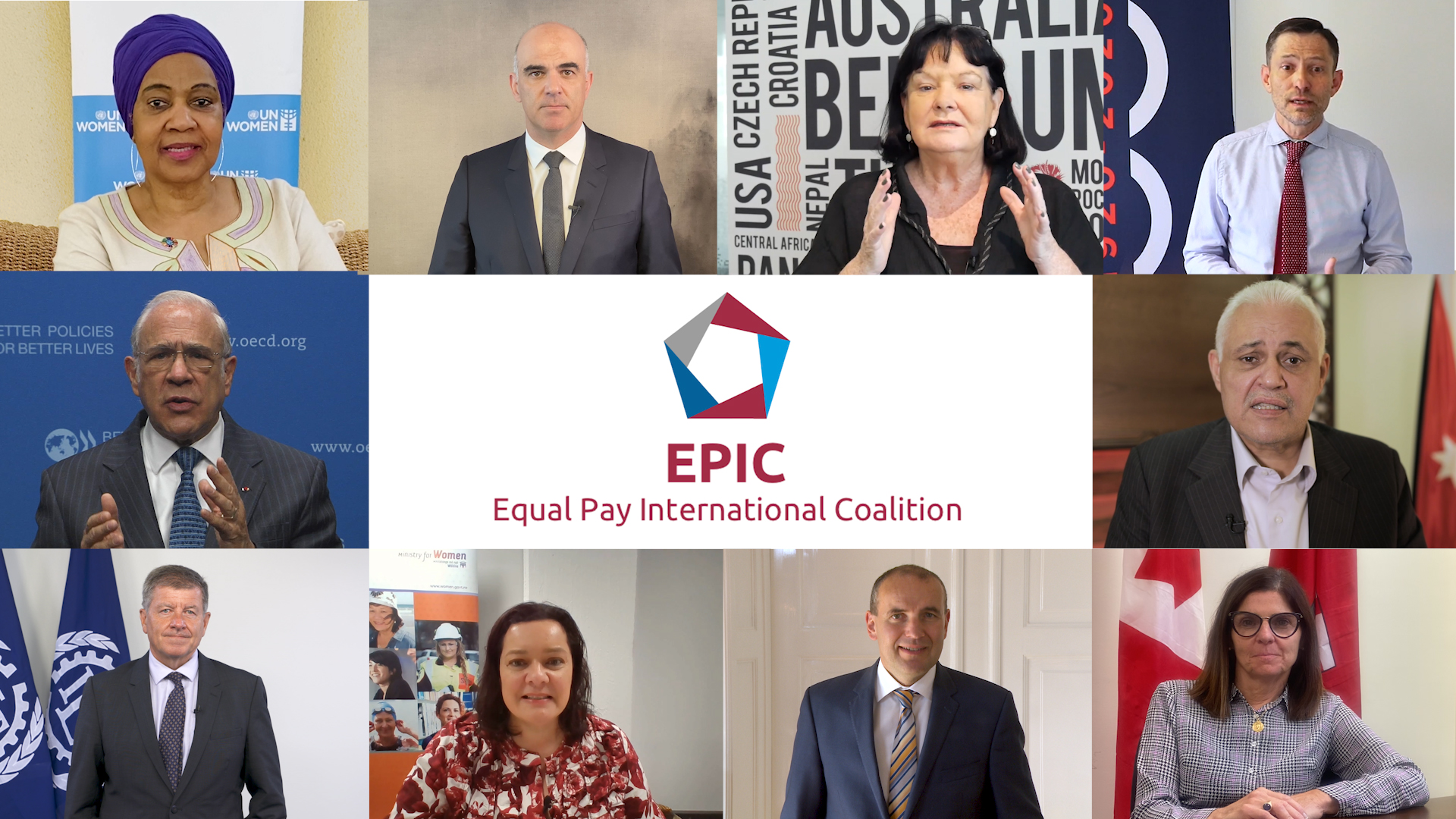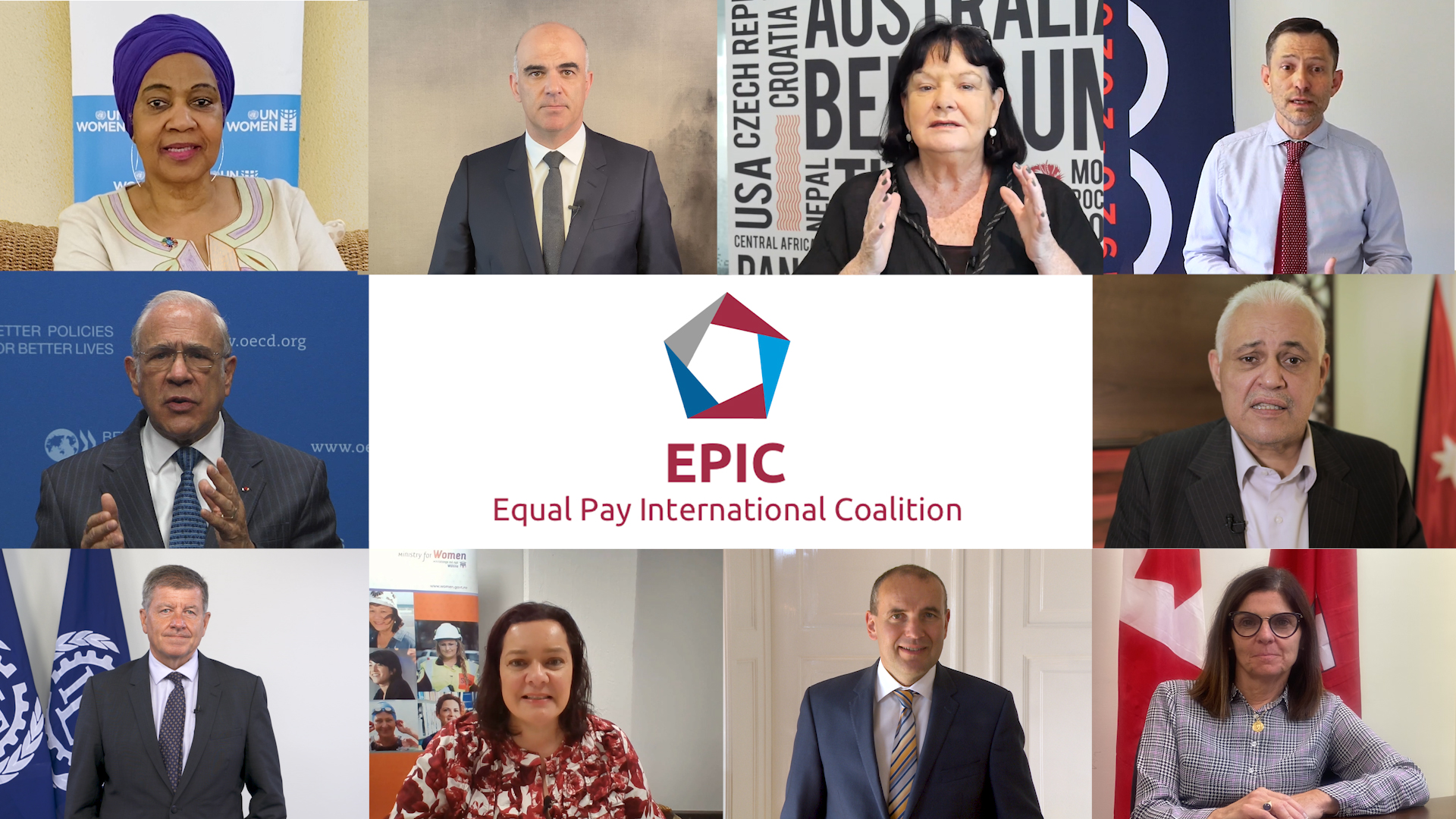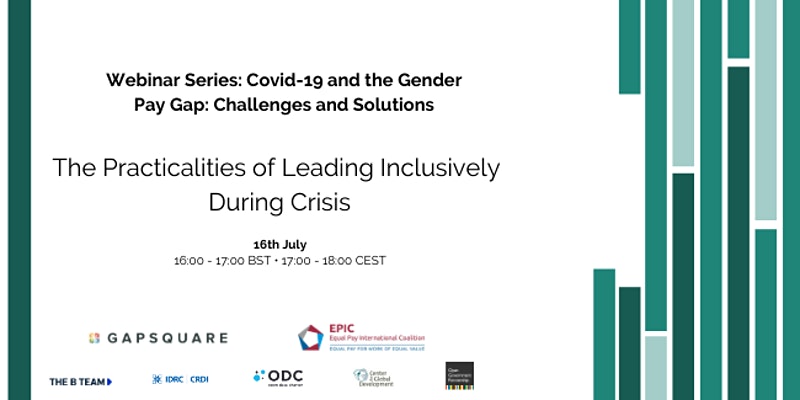Join the Equal Pay International Coalition



Equal pay is one of the targets of the 2030 Agenda for Sustainable Development, which recognizes its key to inclusive growth and poverty reduction. Sustainable Development Goal 8 calls for the promotion of sustained, inclusive and sustainable economic growth; full and productive employment; and decent work for all. Equal pay is also addressed in the Beijing Declaration and Platform for Action (BPfA) as one of the indicators for women’s empowerment. Georgia has committed to fulfilling the obligations indicated by these international instruments.
The Labour Code of Georgia – as the primary regulatory framework for employment relationships – does not cover the equal pay principle, nor does it specify the notion of direct and indirect discrimination. According to the International Labour Organization (ILO) Committee of Experts, the Georgian national courts have reported no cases regarding equal pay between men and women. The Committee assumes that when no cases or complaints are being lodged it is likely to indicate a lack of an appropriate legal framework, a lack of awareness of rights, a lack of confidence in, or absence of, practical access to procedures, or a fear of reprisals. The Labour Code is currently under-going a reform process and the proposed draft includes a definition of discrimination based on pay.
The celebratory event is organized in the framework of the project “Women’s Economic Empowerment in the South Caucasus” (WEESC) funded by the Swiss Agency for Development and Cooperation (SDC) and Austrian Development Cooperation through the Austrian Development Agency (ADA) and implemented by UN Women. The objective of the event is to provide a platform to discuss Georgia’s commitments to the EPIC and addressing the Gender Pay Gap (GPG). The event will also discuss the role of social partners in addressing the gender pay gap aiming to increase the motivation of private companies, employers’ organisations and trade unions to join EPIC.
The event will gather representatives from the Parliament of Georgia, government agencies that are involved in policy level decisions, data production and analysis on the gender pay gap from Armenia and Georgia; Ministry of Economy and Sustainable Development (MoESD) of Georgia; Department of Labour under the Ministry of Internally Displaced Persons from the Occupied Territories, Labor, Health and Social Affairs (MoIDPOTLHSA) of Georgia; the National Statistics Office of Georgia; and representatives of the Ministry of Labour and Social Affairs of Armenia; and the National Statistics Office of Armenia. In addition, the event will include representatives from the Trade Unions and Employers’ Associations of Armenia and Georgia and key civil society organizations.
Due to the epidemiological situation the event will be held fully online on 18 September. Register here
On the occasion of the first International Equal Pay Day, and in the midst of the fallout from the global COVID-19 pandemic, the Equal Pay International Coalition (EPIC) is hosting a virtual global Call to Action encouraging all labour market actors to take the necessary steps to ensure that equal pay is at the heart of recovery efforts worldwide.
Speakers
Moderated by Nozipho Tshabalala.
Panellists:
Remarks by the EPIC Secretariat:
Call to action:
Representatives of the EPIC Steering Committee will participate in a curtain raiser video.
Watch the event live here!
Join the conversation by using #EqualPayDay and follow us on Twitter at @epic2030.
For further information, see International Equal Pay Day: only together can we build a more inclusive and fair world of work
Gender equality is a fundamental human right as well as a cornerstone of a prosperous, modern economy that generates sustainable inclusive growth. Gender equality is essential for ensuring that men and women can contribute fully at home, at work and in public life, for the advancement of societies and economies at large.
However, despite decades of gains in women’s educational attainment and employment participation, legislation, policy action and activism, women around the world continue to be paid less than men. Globally, the gap in earnings between men and women stands at about 20%. Even inside the largely developed set of OECD countries, the average gender pay gap still stands at 13%. On this first International Equal Pay Day, we must acknowledge that equal pay is still far from a reality.
The gender pay gap has many causes. Part is related to the fact that, even in the world’s most gender-equal countries, women’s work often still looks very different to men’s. Indeed, despite the remarkable progress made by women over the past half-century or so, women still often work shorter hours, find themselves in different jobs and industries, and enjoy less seniority than men. They are also much more likely than men to interrupt their careers or adapt their paid work for family and care reasons.
But gender differences in careers cannot explain all of the pay gap. Time and again, studies from across the globe find that significant gender pay gaps persist even after accounting for job and worker characteristics. Traditional notions on women’s career aspirations and expectations contribute to discrimination in hiring and career development which helps explain why gender pay gaps widen over the life course with women being at a higher risk of poverty,
A strong, co-ordinated and a multi-faceted approach involving a range of stakeholders is needed if we are to properly tackle the multiple causes of the gender pay gap. Governments, employers, unions and other stakeholders are increasingly recognising the importance of achieving equal pay and gender equality more widely. In recent decades, many governments from across the world have strengthened anti-discrimination legislation, improved women and girls’ access to education and training, and introduced family-friendly policies aimed at ensuring all men and women can participate fully in paid work. Many employers, for their part, have introduced programmes and practices aimed at stamping out discrimination and supporting women’s careers, while unions have broadened their priorities in collective bargaining processes to include work/life balance issues that are so important to both mothers and fathers.
Furthermore, the first International Equal Pay Day comes about while the world is grappling with the COVID-19 pandemic, a fateful event that has heightened inequalities at work and at home. Indeed, women have been at the core of the battle against COVID-19:
• They make up two-thirds of the health workforce worldwide, including 85% of nurses and midwives, and account for 90% of long-term care workers across OECD countries.
• The crisis-amplified women’s unpaid work burden, as women picked up much of the additional unpaid work caused by widespread school and childcare facility closures.
• The short-term economic fallout from COVID-19 particularly affected sectors (e.g. accommodation, food and beverage and retail services) that rely on physical customer interaction, many of which are major employers of women. As a result, women have suffered disproportionately from reduced working hours and job loss across G20 countries for which data are available.
Globally, almost 510 million workers, or 40 per cent of all employed women, work in hard-hit sectors, including accommodation and foodservices; wholesale and retail trade; real estate, business and administrative activities; and manufacturing.
Furthermore, in developing countries, women are among the most vulnerable workers within the informal economy without access to social protection and COVID-19 national stimulus packages.
In all, COVID-19 threatens to erode many of the gains made on gender equality over recent decades. Without affirmative action from all leaders of the labour market, there is a risk that decades worth of hard fought progress towards women’s economic empowerment and gender equality in the world of work could be reversed.
It does not have to be that way. Policy makers, employers, unions and other stakeholders must work together to turn the COVID-19 crisis into an opportunity for accelerating change towards equal pay for work of equal value.
On this first International Equal Pay Day, EPIC is organising a virtual event to exchange ideas and evidence on how to accelerate change towards equal pay for work of equal value. Topics to be discussed include:
• How can employment conditions of health and social care workers be improved to give them better recognition of their contribution to the economy and society at large?
• How can we improve data on gender gaps at the work floor and the impact of policies?
• What should be the policy priority for governments, employers of different sizes and unions?
• What works best in improving women’s participation in managerial and leadership positions?
• How can role models most effectively contribute to generating change in attitudes towards more gender equality?
We also hope that your country, employers organization, union, civil society grouping and/or other stakeholder group can join us in EPIC and our call to action as only together we can ensure that the response and recovery efforts lead to building a more inclusive and fair world of work.
For more information and evidence on gender pay gap see the “resources” on our webpages.

By Hazel Lush (Gapsquare)
In the context of crisis, previously important work can seem insignificant. At Gapsquare as the Covid19 crisis emerged, we understandably saw talk about inclusion turn to talk about survival, efforts to close the gender pay gap put aside by employers and the governments they operated under and the conversation around inclusive practice, people of colour and workplace culture go completely silent.
But this silence also revealed how much we underestimate the broader implications of inequality. After the initial reaction by employers, making sure everyone was safe and had all the basic tools they needed to go about their days, heads turned to who was being most impacted by the pandemic in the workplace. And the answer was simple, Women, ethnic minorities and disabled employees.
This was the momentum behind the second in a series of events run with the Equal Pay International Coalition (EPIC), ‘The Practicalities of Leading Inclusively During Crisis’. Hosted by Gapsquare as part of a global partnership of equality-led organisations, this event, taking place on 16th July 2020, aimed to tackle some of the practical questions facing employers around inclusion and intersectional gender equality at this time.
Joined by incredible speakers Lopa Banerjee at UN women; Sallie Jian, Head of SAP.iO in New York; Colleen Ammerman of Harvard Business School Gender Initiative; Patricia Veringa-Gieskes of The Job Factory and Johannes (JOOP) Smits, Director, People and Organisation, PwC Switzerland this event tackled the need for understanding and ideas for best practice at this time.
At the event, CEO Gapsquare Zara Nanu shared exclusive research collected from global employers and organisations around their reactions and plans during this period. This research, which you can still take part in here and the conversation that followed revealed some interesting facts:
69% respondents believe that pay equity is still a priority
Prior to this survey, Gapsquare found that inclusive practices were being deprioritised, but this research may indicate a global reshifting of focus back onto equity.
‘Gender equality projects were widely cancelled in the face of Covid…women and minorities have found their positions further diminished. But it seems to be back on the agenda now’ Johannes (JOOP) Smits, Director, People and Organisation, PwC Switzerland (During event).
Only 30% of respondents have accurate data around ethnicity at present
This is a figure that plays out in Gapsquare’s experience directly with clients. In the wake of Black Lives Matter, employers are embracing increased momentum around ethnicity pay analysis and making sure their pay systems are fair for all people, including people of colour, disabled employees, LGBTQIA+ employees, etc.
This momentum must not be lost, but data collection and global alignment (if an organisation has offices in various countries) has to start with conversations with employees about reservations they may have and the importance of this data collection. You can learn more about conducting ethnicity pay analysis here.
Most respondents do not have data around employees with caring responsibilities that might impact their work
Women are more likely to hold a ‘caregiving burden’ noted Colleen Ammerman, Director of the Gender Initiative, Harvard Business School during the event, ‘in this new normal there are lots of ways in which gender equality is being magnified’. Lack of intelligence around who is caring for significant others is problematic, opening up conversation with your employees (men and women) and the demands on their time outside of work could lend itself to innovative solutions and enhancing productivity and wellbeing.
Ammerman went on to note that the motherhood penalty means that women “tend to be offered less money for jobs, are less likely to be hired, less likely to be promoted.. It stems from a belief that women with children are less committed to their work”. This research and the event itself show us that we must be careful not to doubly penalise women for caring responsibilities.
36% of respondents believe that learning & development has increased for their employees since the crisis began
This is great news and shows that employers are looking to reskill workforces. Mckinsey (2020) writes of the increased momentum around reskilling in the context of Covid19. Keeping in mind that investment in reskilling can be an alternative to redundancies for groups of employees, we hope that employers are using reskilling as a way to maintain an inclusive workplace.
53% of respondents are worried about financial growth in the wake of this crisis
Companies are worried about financial growth and are therefore also worried about whether they can keep their employees and which of their employees they should let go. Investment in maintaining opportunities for female workers, people of colour, disabled employees etc, should be essential to the discussions about growth. At the moment, these are the people most at risk.
This is reflected in the startup world where money has, in the past, failed to reach women and people of colour led businesses. Sallie Jian, Head of SAP.iO in New York noted at this event ‘Capital from early stage companies at the moment is restricted… women and minorities don’t often have the same networks as men to raise capital.’ Monitoring to whom money and opportunity is extended is a key aspect of maintaining a fair economy going forward. What happens in the startup world will ultimately be reflected in companies in the future. If our most innovative spaces can’t welcome diverse minds, we are at risk of long term issues for the future of work. So let’s do better.
In her introduction to this event, Lopa Banerjee of UN Women noted: ‘Covid did not happen in a vacuum, we already had deep inequalities… it has shone a light on the need for multi stakeholder reaction to these issues’.
In this context, we must turn towards, not away from inclusive practice when we are in a period of change. We must note the risks of not asking the right questions when we’re making long term financial decisions. Inclusive practice should be built into decision making. This event and the EPIC series in general, sheds light on a range of experiences and insights and asks us to move now on inclusion, gender and wider equality, despite and because of the challenges we face.
To catch up on this event, watch it here.
To be part of the research and hear updates on the employer context, head here.
The next event in this series will be on Tackling the wage gap through digital solutions, and will take place on Wednesday 19th August at 13:30 CEST, 12:30 BST and 0730 EST. Stay tuned here for updates.